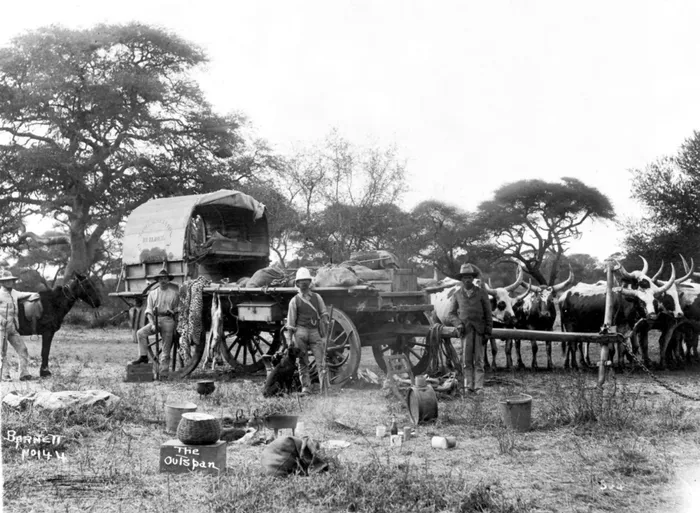
The Outspan, picture of hunters next to an ox wagon.
Image: Barnett Collection / Independent Newspapers Archives
WHEN I was at school, I was pretty much influenced by my classmates. When everyone agreed on something, I didn't hesitate, I just went along. I guess that’s how peer pressure works.
One thing my classmates agreed on was that history was boring. Therefore, before I knew it, I hated history!
However, having seen seven decades already – from the ’60s to the ’20s – I am now practically a historic relic. Now the subject is fascinating, and I salute those who took, and take, time to record history.
The other day, I learned some fascinating trivia. I am interested in etymology (the origin of words), and therefore I am elated that I stumbled upon the following story.
Late December 1835, somewhere in the Karoo, a group of Trekkers journeyed across the sun-baked plains. Water was low, and the men had resorted to drinking their stocks of alcohol so that the women, children and animals could have water.
What saints men are!
One of the Trekkers, Albertus Andries Barnard, nicknamed “Baba”, apparently was overwhelmingly concerned about the welfare of the women, children and beasts and took it upon himself to consume large volumes of the spiritous fluids … seemingly not wanting the weaker Trekkers to suffer its bedevilling effects.
However, early one Friday morning, Baba woke up with a pounding headache and a thirst more vast than the Karoo. His companions were unsympathetic simply because Baba had, almost single-handedly, depleted their alcohol supplies.
The leader of the party, amused and chuckling uncontrollably, asked a question that made the entire campsite burst into roars of laughter.
“Wanner was Baba laas so siek?”
Now because of Baba’s condition, and because that simple question made such an impact on everyone there, the story was shared far and wide. When they met other travellers, when they sat around campfires at night, and later on when they just needed a pick-me-up.
And, hey presto, a new word was born … that was the origin of the word “babbelaas”!
Of course, for those who don’t know me well enough, I have to add right now that the story of Albertus Andries Barnard you just read is completely false. I made the story up on Wednesday morning after my second cup of coffee.
See why caffeine is bad for you?
Here’s the problem: There is a mountain range of misinformation out there. And just the fact that the “babbelaas” story is going online on our website, means that AI has access to it, and there is a slim chance that unsuspecting and lazy youngsters will use it for a homework assignment one day, if AI suggests it to them. I believe it’s possible, seeing as the DFA is a reputable newspaper.
Granted, misinformation – like the origins of the word “babbelaas” – isn’t a new phenomenon. People have always stretched the truth and made fanciful claims that were spread far and wide.
Falsehoods and fabrications have influenced societies for centuries. What’s changed in modern times is that with the rise of digital technology, not only has it made it easier to create fake content, but also to spread it.
What once required skill now takes only a few clicks. Convincing fake videos, audio clips, and fabricated texts can go viral in moments, blurring the line between reality and deception.
The real issue lies in media literacy. We are our own gatekeepers.
As the line between truth and deception is blurred by technology, questioning and verifying what we are exposed to is more crucial than ever.
The fight against misinformation isn’t just about regulating technology but becoming empowered to think critically.
Related Topics: